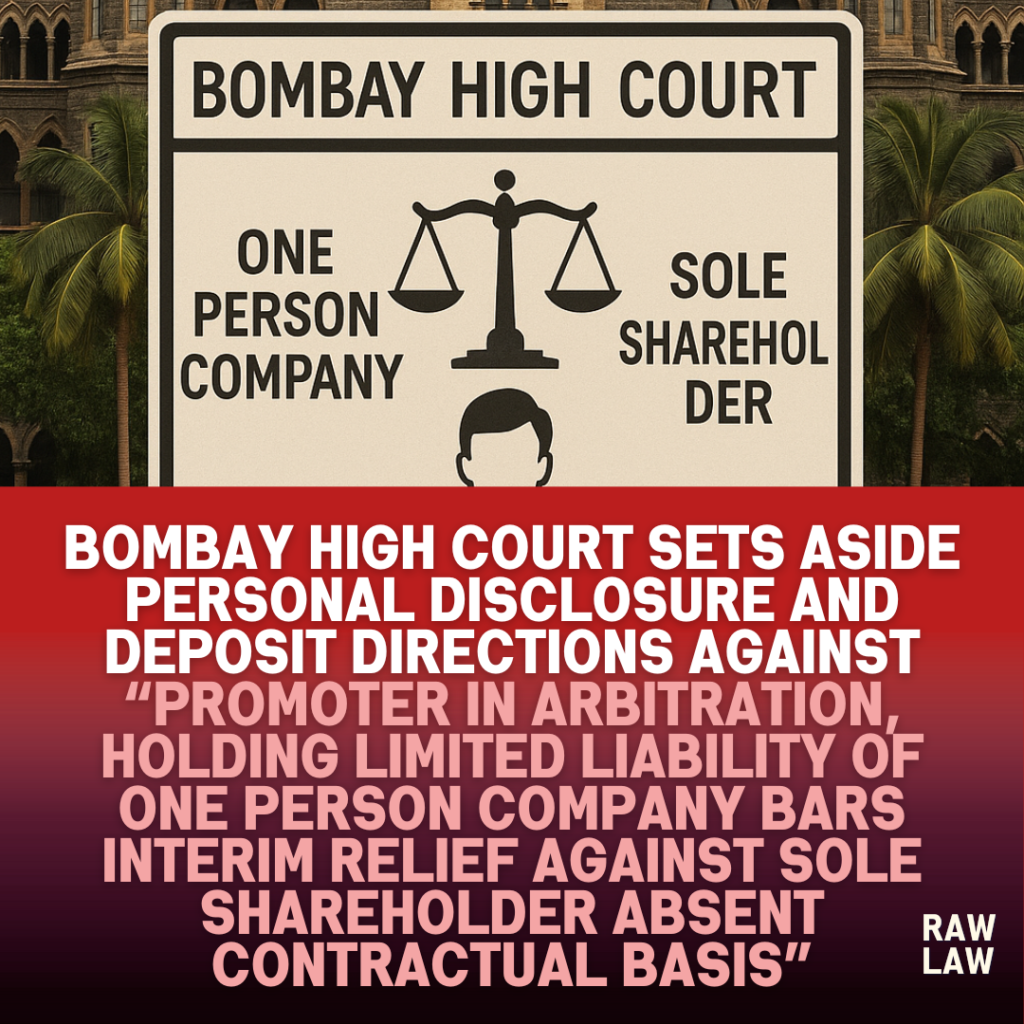Court’s Decision
The Bombay High Court partially allowed the appeals under Section 37(2)(b) of the Arbitration and Conciliation Act, 1996 by setting aside the arbitral tribunal’s direction requiring the sole shareholder and director of the One Person Company (OPC) to make personal disclosures and deposits, while upholding the order requiring the OPC itself to maintain a fixed deposit of ₹10.40 crores and make disclosures pending arbitration.
Facts
Innovative Film Academy Pvt Ltd (an OPC formed by Saravana Prasad) entered into a production agreement with Endemol India to produce regional Masterchef series. Endemol delivered Tamil and Telugu episodes and raised four invoices totaling ₹15.93 crores, of which ₹4.45 crores was paid, and ₹1.08 crores was adjusted, leaving ₹10.40 crores outstanding, which became the subject of arbitration under the Arbitration Act. Endemol relied on a confirmation letter issued by Innovative acknowledging the dues. The arbitral tribunal, under Section 17, directed Innovative and Prasad jointly to deposit ₹10.40 crores in a fixed deposit, and to disclose personal and corporate financial details.
Issues
- Whether the arbitral tribunal could direct personal disclosure and deposit against the sole shareholder/director of an OPC in an interim order.
- Whether reliance on the confirmation letter acknowledging dues justified a deposit direction under Section 17.
- Whether the tribunal’s interim order was legally sustainable under the principles of limited liability and corporate separateness.
Petitioner’s Arguments
The petitioner argued:
- Innovative is an OPC with limited liability; personal liability cannot be imposed on its sole shareholder.
- The confirmation letter was routine for audit purposes, not a conclusive acknowledgment of debt.
- No contractual or factual basis was shown to pierce the corporate veil.
- The arbitral tribunal erred in treating Innovative and Prasad as one and the same, violating company law principles.
Respondent’s Arguments
Endemol argued:
- The confirmation letter, undisputed by Innovative, was strong prima facie evidence of dues.
- Prasad, being the sole shareholder and director, was effectively managing all affairs, creating an implied liability.
- Directions for deposits were necessary to secure the claim pending arbitration.
- The tribunal’s interim measures were reasonable under Section 17.
Analysis of the Law
The Court analysed:
- Section 17 of the Arbitration Act permits interim measures to secure claims, but must respect the Companies Act’s limited liability framework under Section 2(62) for OPCs.
- The principles in Saloman v. Saloman & Co (1897) regarding corporate separateness and limited liability.
- The tribunal’s powers under Section 17 need not strictly follow Order 38 Rule 5 CPC, per Essar House v. Arcellor Mittal (2022) and Ajay Singh v. Kal Airways (2017).
Precedent Analysis
- Saloman v. Saloman (1897 AC 22): Established the principle of corporate separateness and limited liability.
- Essar House v. Arcellor Mittal (2022): Tribunal can order interim security without strict CPC adherence.
- Ajay Singh v. Kal Airways (2017): Tribunal can direct security for claims under Section 17.
- Cox & Kings v. SAP India (2024): Does not override limited liability in the absence of fraud or contractual assumptions of liability.
Court’s Reasoning
The Court held:
- The arbitral tribunal erred in imposing personal obligations on Prasad, ignoring the limited liability framework of OPCs.
- There was no contractual or factual basis for lifting the corporate veil.
- The tribunal’s direction for Innovative to maintain a fixed deposit was reasonable, balancing the security of claims while allowing control over funds.
- The confirmation letter was relevant for prima facie liability but would require examination during arbitration.
- The tribunal’s directions on Innovative’s disclosure of its assets and liabilities were valid; however, similar directions against Prasad were legally unsustainable.
Conclusion
The Bombay High Court:
- Set aside the arbitral tribunal’s directions requiring Prasad to make personal disclosures and deposits.
- Upheld the direction requiring Innovative to maintain a ₹10.40 crore fixed deposit and make corporate disclosures pending arbitration.
- Clarified that limited liability under company law must be respected unless contractual liability or fraud is proven.
Implications
- Reinforces corporate separateness and limited liability of OPCs in arbitration proceedings.
- Clarifies the scope of Section 17 interim measures while respecting statutory corporate structures.
- Highlights the balance between securing claims and protecting corporate protections under Indian company law.
Short Note on Cases Referred
- Saloman v. Saloman: Corporate separateness, limited liability.
- Essar House, Ajay Singh: Tribunal’s power to order deposits under Section 17.
- Cox & Kings: No implied personal liability for directors without clear contractual/factual basis.
FAQs
1. Can a sole shareholder of an OPC be directed to deposit or disclose personal assets during arbitration?
No, unless there is a clear contractual or legal basis, personal liability cannot be imposed on OPC shareholders under the Companies Act.
2. Can an arbitral tribunal order a company to deposit security during arbitration?
Yes, under Section 17 of the Arbitration Act, a tribunal can direct deposits to secure claims while maintaining fairness.
3. Does a confirmation letter acknowledging dues conclusively prove liability?
No, it creates a strong prima facie case but requires evidence and examination during arbitration.
